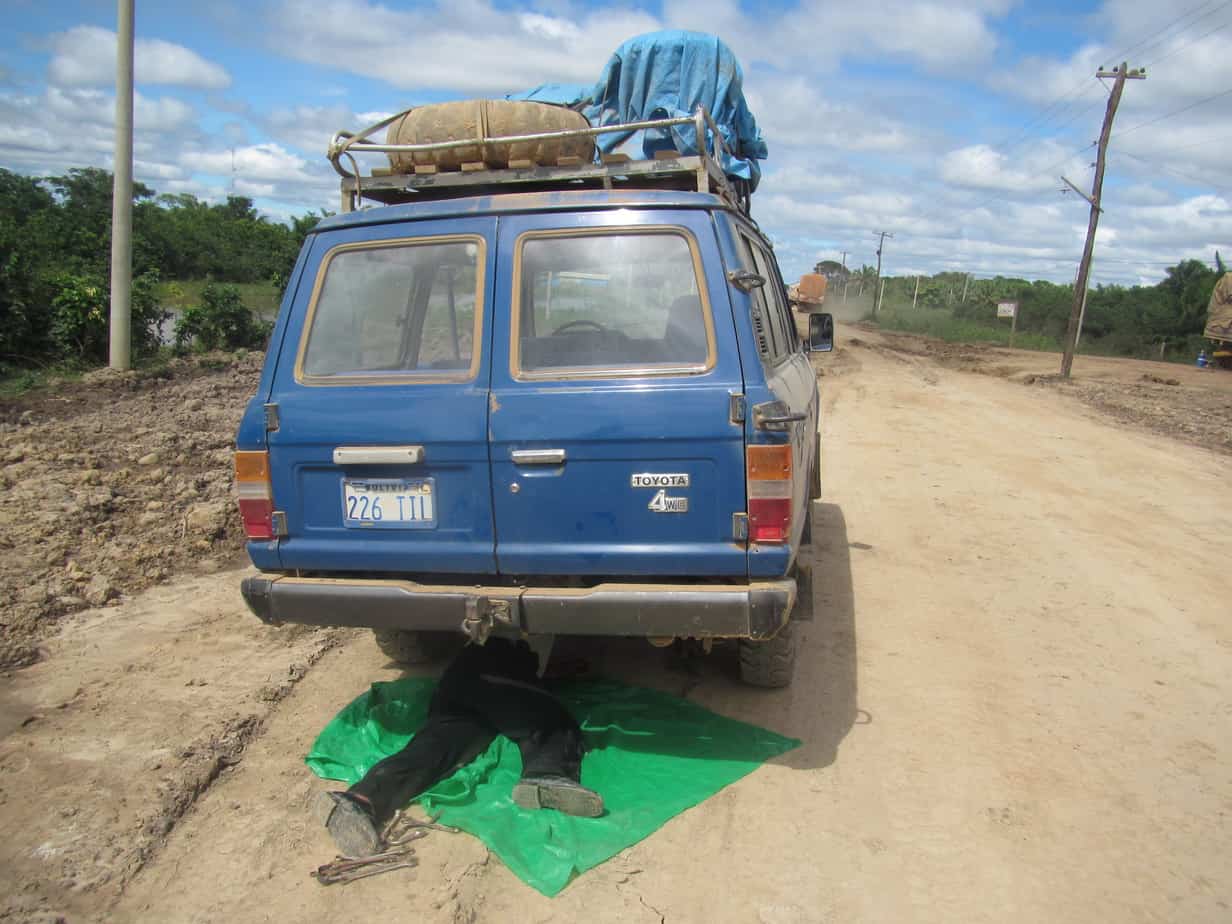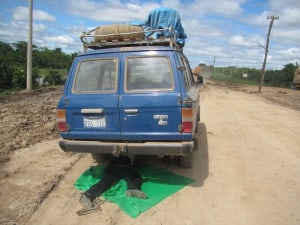Listen to our Bolivia Episode HERE
One of the most important lessons you learn traveling is that bad experiences make great stories.
Hanging around the hostel at the end of the night, you don’t tell people about the pleasant time you had at the beach. Instead, you and your new friends are all laughing about how everyone got harassed and involuntarily massaged every ten minutes all day.
You don’t bond over pleasant; you bond over pain, awkwardness, discomfort.
When you travel for a few months, you learn this lesson over and over again.
You internalize it so much that the when you are nervous about something bad happening, you think, “well at least it would make for a great story.”
Some of the best stories I’ve heard on our podcast came from an episode with Felix Mantz. Felix drove to Mongolia with a friend and had all sorts of chaotic moments.
From getting guns pointed at them at the Iranian border, to wrecking their car in Turkmenistan, I’m sure those moments were terrifying, frustrating, and painful. But hearing them second hand is incredible.
Two years ago, when we visited Jamaica, we stayed at a guesthouse in the hills near Montego Bay. Taxis in Jamaica are absurdly expensive, so we decided to take the public bus.
As we walked away from the main tourist strip towards the bus terminal in downtown Montego Bay, we were stopped twice by the tourist security people to tell us that we should probably take a taxi.
As soon as you leave the tourist side of town, you are in a different world. There are no more white people. No more fancy store fronts. Everything is run down; the shops, the cars people are driving, and most of all the busses.
After some confusion, we found our way to the bus that we needed to take. It cost less than a dollar.
We hopped on to this old beaten up mini-bus. Towards the back of the bus, there were a few seats open, so we walked back there. The bus looked full, so we thought we would leave soon. But that was not what happened.
The amount of seats on the bus was not a constraint that anyone cared about, so people piled onto the bus. Children sat on laps, and the aisle filled up with bodies. If you were at the back of the bus, you weren’t getting off the bus at an early stop.
We didn’t know what stop to get off at. We had imagined that we would spot it out of the window. That we would recognize the area we were staying in. This would have been a great plan if it was still light out. But the confusion finding a bus and the endless cramming of bodies onto it had taken us well into dusk.
The sun had set, and outside was slowly turning from gray into black.
The old Jamaican woman squashed next to us seemed concerned. She was asking us questions in Patois. After a few tries, we succeeded in communicating where we were going. She knew the name of the stop. She said she would tell us when we got there.
The area that we were staying in was pretty rural. Lot’s of space between houses. No street lights. A few people around, but not many. It is not hard to imagine yourself getting mugged while you walk home in the dark.
We sat on the bus wondering if this was all going to work out. Would we find our stop? We didn’t have cell phones, so missing it wouldn’t be good. Would we get mugged? We didn’t bring much stuff, but it still would kind of suck.
We sat on the bus feeling nervous, and I kept coming back to a crazy car ride we had in Bolivia.
We went on a tour in Rurrenabaque, Bolivia. Rurrenabaque is so small that the airport terminal is literally a house. There are cows eating grass on the side of the runway, and the airport “bar” is a concession stand in a shack, under a tree, 30 feet from the front door.
Our trip was to the Bolivian Pampas; wetlands on the edges of the Amazon basin. We were staying in a bamboo lodge, propped up above the wetlands.
To get there was a 2-hour car ride over a unmaintained dirt road and then a one hour boat ride.
A driver picked us up in a blue Toyota 4-runner that looked at least 30 years old. An extra bench of seating had been Macgyvered into the truck space, and that is unfortunately where I found myself sitting.
An old Bolivian man was behind the wheel. He didn’t appear particularly sober. The road to Las Pampas had been hit by some heavy rain not long before and there were large muddy patches and spots where the mud had dried into an obstacle course.
None of these perils seemed to phase our driver as he sped down the road, racing the other SUV’s filled with other gringo’s heading on similar tours.
I’m guessing that there used to be suspension on the car, but it had stopped working a long time ago. Every bump we hit caused the two of us in the fake back seat to smack our heads on the roof.
All of this wasn’t particularly unnerving until we crashed for the first time.
As we drove through a muddy patch, we veered left and went into the ditch.
Us gringo’s made our way out of the car, playing hopscotch to avoid the mud. Eventually, one of the other tour drivers came, attached a strap, and towed our car back onto the road.
I don’t know enough about cars to tell you what the problem was, but this was clearly not the first time this had happened. The ropes and tape that held the steering system together had fallen apart, but after a few minutes of tying it all back together we jumped back in and started down the road again.
We all figured that this would be a wake-up call for our driver and that we would be continue at a more mellow pace. We were wrong.
We went off the road a couple more times on the way. One time the driver removed a part from the car, then we drove off without it before he realized that he should keep it and wanted to go back for it.
Eventually, we did make it to Las Pampas, and we had a great time exploring the wetlands.
In the weeks following this, though, we told this story of our crazy Bolivian driver again and again. It was not an experience unique to us. Almost everyone who had spent time in Bolivia had similar crazy stories.
It wasn’t the story about our fun time swimming with dolphins that stuck with people we were meeting, but the terrifying car ride.
As we sat on the bus in Jamaica, this experience was at the front of my mind. I reminded myself that the worst thing that could happen would be we lose some cash, drivers license, and an old camera. BUT, that would make for an awesome podcast episode.
The difficult, annoying, and adverse experiences that we try so hard to avoid in life, and while traveling, are usually the exact experiences that make us most interesting . You remember a crazy and difficult time more than a lot of the pleasant but uneventful days. You grow way more from the challenges, than from the days with no obstacles. And you end up with great stories because of these bad experiences.
Back in Jamaica, after about twenty minutes on the bus, the woman beside us started yelling at the driver. We had reached our stop. We squished through everyone in the aisle and made the 15-minute walk in the dark back to our guesthouse. Everything worked out fine. There wasn’t much to be afraid of after all.





